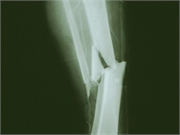Genetically Modified Mosquitoes to Be Released in Florida Keys
The genetically modified mosquitoes produce female offspring that die in the larval stage
Antibiotic Exposure Linked to Risk for Inflammatory Bowel Disease
Patients receiving one, two, three or more antibiotic dispensations have increased odds of IBD
Evinacumab Cuts LDL-C Level in Familial Hypercholesterolemia
LDL-C down at week 24 with evinacumab versus placebo in homozygous familial hypercholesterolemia
Longer Bisphosphonate Use May Up Atypical Femur Fracture Risk
Rapid decline in atypical fracture risk seen when bisphosphonate discontinued in women ≥50 years
SARS-CoV-2 Nasopharyngeal Load Higher in Children Than Adults
Highest viral load seen in the first two days of symptoms in children with SARS-CoV-2 infection
Relationship Between Alzheimer Disease, Sleep Patterns Explored
No evidence supporting causal role of disturbed sleep patterns on AD or between major depression and AD
Healthy Diet Inversely Linked to Prodromal Parkinson Disease Features
Adherence to aMED, AHEI dietary patterns inversely tied to constipation, daytime sleepiness, depression
Disparities Seen in COVID-19 Hospitalizations in Racial/Ethnic Subgroups
Percentage of hospitalizations among Black patients exceeded percent in the state population
Each Week of Early Alcohol Use Tied to Incremental Miscarriage Risk
Risk increased even at low levels of consumption and when excluding binge drinking in first trimester
Short-Term PrEP Feasible for Men at Risk for HIV on Vacation
High levels of medication adherence observed; many interested in transitioning to long-term PrEP














